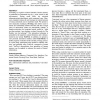Free Online Productivity Tools
i2Speak
i2Symbol
i2OCR
iTex2Img
iWeb2Print
iWeb2Shot
i2Type
iPdf2Split
iPdf2Merge
i2Bopomofo
i2Arabic
i2Style
i2Image
i2PDF
iLatex2Rtf
Sci2ools
CHI
2011
ACM
2011
ACM
YouPivot: improving recall with contextual search
According to cognitive science literature, human memory is predicated on contextual cues (e.g., room, music) in the environment. During recall tasks, we associate information/activities/objects with contextual cues. However, computer systems do not leverage our natural process of using contextual cues to facilitate recall. We present a new interaction technique, Pivoting, that allows users to search for contextually related activities and find a target piece of information (often not semantically related). A sample motivation for contextual search would be, “what was that website I was looking at when Yesterday by The Beatles was last playing?” Our interaction technique is grounded in the cognitive science literature, and is demonstrated in our system YouPivot. In addition, we present a new personal annotation method, called TimeMarks, to further support contextual recall and the pivoting process. In a pilot study, participants were quicker to identify websites, and preferred usi...
CHI 2011 | Cognitive Science Literature | Contextual Cues | Human Computer Interaction | Interaction Technique |
| Added | 25 Aug 2011 |
| Updated | 25 Aug 2011 |
| Type | Journal |
| Year | 2011 |
| Where | CHI |
| Authors | Joshua M. Hailpern, Nicholas Jitkoff, Andrew Warr, Karrie Karahalios, Robert Sesek, Nik Shkrob |
Comments (0)

